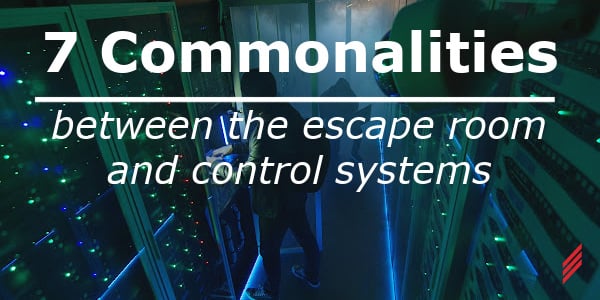How Does a Chairman of the Board Impact Their Company?
by Jeff Silcox on Apr 20, 2023 1:46:23 PM

Earlier this year, I took on the job of Chairman of the Board at Hallam-ICS. Last week, I was asked to speak at a company event and to address a question raised by one of our colleagues,
How Does a New Chairman of the Board Impact the Company?
Seemed like a slam dunk at first, but the more I thought about it, the more I puzzled over the word impact. How would I know, how could anyone know? In an organization where everyone contributes to its success, how much impact does any one individual really have? I thought about my predecessors in the job, Dave Hallam the Company Founder and John Butterfield, an original Shareholder and what I experienced under their leadership. I thought about my own experience, that brought me to this point in my career, and how different it was from theirs. I wondered if it mattered.
I also thought about the Board and how the work that we do is so different from our day to day engineering work, where we deal in data, codes, calculations and known solutions to known problems. At the board we don’t focus on engineering, we focus on the business of engineering. Organizationally, we look mostly forward, and truthfully, there are many things that we don’t know. There are also a lot of things that we do know and are powerless to do anything about. The further we look into the future, the less we know for certain. In this environment, a sense of humility, a willingness to listen to differing opinions and an interest in seeking consensus trump one’s ego and personal ambition. All of the Board’s decisions are influenced by these factors. At times we know our decisions are right, other times we think they are right and sometimes we feel they are right.
As I thought about the Board, I was reminded of my time in Little League baseball where our coaches spoke about the importance of “the fundamentals” and drilled us in them relentlessly. Of course, they rarely knew much about the other kids we would be facing come game time. They focused on our preparation, in the most important skills, and then managed our talent during games to try and get us in the best position to win. Our work on the Board is a lot like that.
Of course, they rarely knew much about the other kids we would be facing come game time. They focused on our preparation, in the most important skills, and then managed our talent during games to try and get us in the best position to win. Our work on the Board is a lot like that.
So what are “the fundamentals” that we think about in running our business? I believe there are three that are really at the core at Hallam-ICS:
Leadership
Our top priority is always good leadership. We know it works. It’s easy to take it for granted when things are going well. During bad times, it can be essential to the company’s survival. Our current leadership team is the second generation in our company’s history. Many of us have been in our positions for 15 years or more. Keith, our CEO, has been in the position for 17 years, and we have prospered. In the coming years, we will need to select our next CEO. I believe that this is the single most important responsibility of our Board. Choosing the right individual can potentially set the company up for another sustained run of growth and success, perhaps extending another 10, 15 or even 20 years. How will we choose this individual? Will he/she come from our internal ranks, or externally? If internal, how will we mentor the individual for CEO? If external, how will we develop the understanding of our culture, that makes this place so great? Important questions.
Knowledge Transfer
Our customers tell us frequently that we have the “best engineers”. We pride ourselves on our technical abilities. However, all of that knowledge, every bit, resides in each individual’s mind and I wonder how much is lost over time because it never gets passed on. As our company grows and expands, as our senior staff retires, as we open new offices, how will we transfer knowledge from senior staff to junior staff, from peer to peer and from region to region? We do a fair job of it now. As a Board, I want to explore how we can be a catalyst to improve, and maybe optimize, knowledge transfer within the company. If we were really successful, where could that take our business?
Organization Structure
We are organized in a Regional Office structure, providing services to customers within a 2 hour radius of each office. This is a great outward facing approach in terms of customer service and proximity to our clients. It allows our staff to be locally based, to work in their local communities and to go home to their families at the end of the day and live a balanced life. Operationally, it can be challenging. Our company is best when we work together and pull in the best resources that we have to solve any engineering challenge. A regional office can tend to turn inwards, become a silo, try too hard to” be all things to all people”, or conversely, be too narrowly focused. Training, consistent work practices, depth of resources and business growth can all suffer. As we contemplate ongoing growth and the addition of new regional offices over the next 5-10 years, what is the most effective organizational structure? We are migrating to more of a hybrid structure, how far should we go with that? Again, key questions for the Board to consider.

You’re probably thinking more questions than answers here, Jeff. And what about share price, isn’t that one of “the fundamentals” that the Board should be thinking about too? Truthfully, no, it’s not something that we spend a lot of time on. The share price is based on things like growth, profitability, backlog and cash reserves, all outcomes of getting “the fundamentals” right. We believe that if we focus on great leadership, knowledgeable and empowered staff and an effective organization structure that our company will prosper, the share price will take care of itself and our employee owners will build wealth.
So, How does a new Chairman of the Board impact the company? Well, I never really got to an answer on that one. I did promise my colleagues that I would take my new job seriously, that I would work hard at it and that I would think deeply about the questions that matter. These are the things that I can control. Time will tell what the impact of that is. I do have a prediction though, that if we come together as an organization, as we always do, to face the challenges we encounter, that we will do just fine.
About the Author
Jeff has retired from Hallam-ICS, but his contributions to the company continue to be valued.
Read My Hallam Story
About Hallam-ICS
Hallam-ICS is an engineering and automation company that designs MEP systems for facilities and plants, engineers control and automation solutions, and ensures safety and regulatory compliance through arc flash studies, commissioning, and validation. Our offices are located in Massachusetts, Connecticut, New York, Vermont and North Carolina and our projects take us world-wide.
You May Also Like
These Related Stories

Three Common Misconceptions that are Costing You Money

Three Common Misconceptions that are Costing You Money-Part 2



No Comments Yet
Let us know what you think